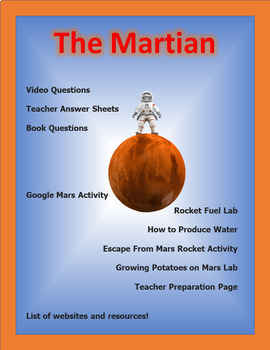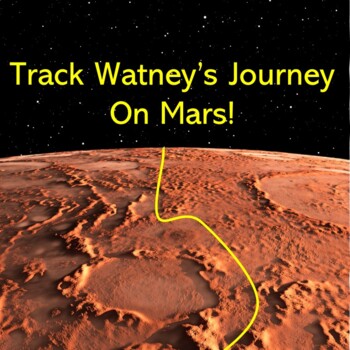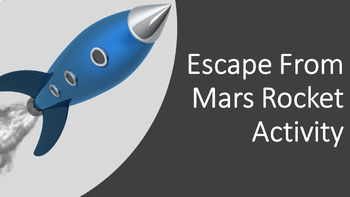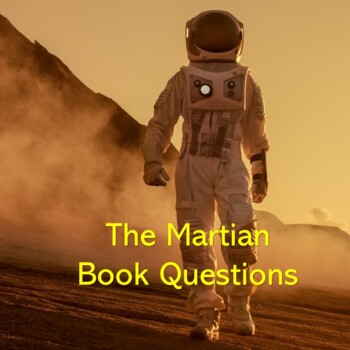The Martian Classroom Labs and Activities
- Zip
What educators are saying
Description
Product Description
This is an multi sensual immersion into the world created in The Martian by Andy Weir. All are in Word format so that you can customize to your school's needs.
The Martian Video Questions
We have included both a blank Student Video Question worksheet and a Teacher Answer Sheet. Asks questions in order of the movies so that you can stop and discuss the various topics as the movie is viewed. Great intro to the concept of Mars colonization.
The Martian Book Questions
A chapter by chapter series of questions designed to enhance student understanding, foster close reading, and generate classroom discussions of topics ranging from ethics to self discipline.
The Martian Book Questions and Activity Guide - The answers to factual questions and a chapter by chapter suggestion of labs that coincide with the book. Students will give their own answers so to fill in each question would be superfluous.
Google Mars Discovery
Open Google Earth and use the Mars feature to follow Mark Watney on his journey across the Red Planet. Use real distances, longitude and latitude while discovering actual photos taken by our many probes and rovers!
How to Produce Rocket Fuel Lab Part of a double lab. Students will complete a classroom safe lab to produce oxygen. Similar to the one that Mark Watney used, but classroom friendly. Electrolysis of water and the products will be used in the next lab.
How to Produce Water Using the hydrogen from the Rocket Fuel Lab, students will combine the gas with oxygen in a classic lab that all students should perform. This is similar to the chemistry that Mark Watney completed to produce water for his potatoes - except no big explosions! Classroom and student friendly.
Escape From Mars Rocket Activity
Your students will mimic Watney’s escape from Mars and interception with the Hermes on a classroom scale. Students build straw rockets from included templates, practice and fill out their included Trials Chart, before shooting for the Wrapped in Velcro, paper towel holder “Hermes” that you pull across the classroom on a string and guide wire. Lots of hands on fun and excitement as the big day approaches. Complete with template to make your miniature rockets!
Growing Potatoes on Mars Lab Activity
Order simulated Mars dirt! Measure and weigh all ingredients before students seal up two carbon dioxide producing crickets and an oxygen producing potato plant in a Mason jar. Students will see the balance of a closed system while observing the growth of potatoes just like in the movie. This experiment can be expanded in many different ways.
Teacher Preparation Page - How to prepare your students for the readings, labs and activities included with this package.
List of websites and resources! Where to buy Mars dirt, free 3D Pathfinder models, and much more!
Created by Jeff Carr
Copyright 2018, 21st Century SCIENCE
All images are used with permission or drawn by me. This teaching unit is not affiliated with Andy Weir, Random House Publishing, or their affiliates. It was created for educational purposes.
Turn your students on to the growing interest in exploring the Red Planet!





